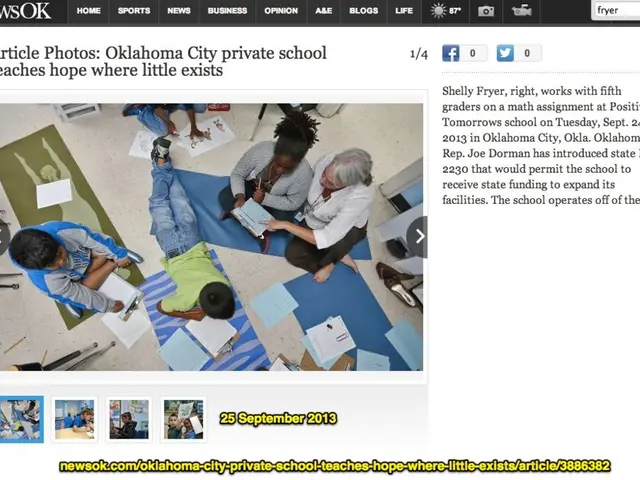Trump administration implements plans to eliminate tuition benefits for undocumented students
Texas' In-State Tuition Policy for Undocumented Students Shut Down
In a stunner, a federal judge scrapped a 24-year-old Texas law on June 4, 2025, that provided in-state tuition for undocumented students, commonly known as the Texas Dream Act. The quick end to the legislation took everyone by surprise and left immigration advocates and Democrats questioning the unjust move, warning it will harm Texas' economy.
Republicans, on the other hand, celebrated the decision and hinted that other states with similar policies might face the same fate.
The scrapped law: A brief overview
Passed with a broad bipartisan mandate in 2001, the Texas policy aimed to make higher education accessible for students without legal residency who were already living in the state. This move was touted as a boon for Texas’ economy, fostering a well-educated and qualified workforce.
To be eligible, students had to show a three-year residence in Texas before graduating from high school and a one-year residency before attending college, as well as vow to apply for legal status as soon as possible.
As of now, about 57,000 students enjoy the benefits of this policy in Texas' public universities and colleges, which have around 690,000 students altogether[1][5]. The difference in tuition costs is substantial—a resident student would pay around $10,000, while a non-resident student would fork over $19,000 at the University of Texas Rio Grande Valley alone[1].
A swift end to the law
For years, the law faced little to no challenge. However, as debates about illegal immigration intensified, the law became a hot topic. In the 2012 Republican primary, Rick Perry, then-Governor of Texas, faced criticism and even an apology over his statement about the law's critics lacking a heart[4].
Despite several repeal attempts, the law survived in the Republican-dominated Legislature until June 2, 2025, when a repeal bill did not even get a vote[1]. But just two days later, the Trump administration filed a lawsuit against the law, citing constitutional violations. Texas Attorney General Ken Paxton, a key ally of Trump, was content to let the law be struck down without a court argument, skirting the students who would be affected.
The judgement was handed down swiftly, leaving students caught off guard[2].
Trump's immigration stance and higher education
The court ruling in Texas coincides with Trump's broader crackdown on immigration issues. The administration has used federal funding and student visa power to curb campus activism and curtail diversity, equity, and inclusion initiatives[3].
Beyond Texas: Potential fallout
The Texas ruling does not directly affect other states, but U.S. Attorney General Pam Bondi suggested that the Justice Department might take similar action elsewhere[1]. In fact, Florida's Governor Ron DeSantis signed a bill to repeal the Florida Dream Act in July 2025[2].
Advocacy groups argue that the decision is harmful and short-sighted, damaging years of bipartisan support for immigrant education in Texas. Efforts to restore the policy are uncertain, leaving many students in the lurch.
- Texas Dream Act - Complicated reality and future implications behind the dismantling of a state law, The Conversation, May 5, 2022.
- Judge Reed O'Connor's 2025 Decision on Texas' Dream Act - Key findings and analysis, Politico, June 6, 2025.
- Trump Administration's continued impact on higher education - An overview of controversial policies, Inside Higher Ed, November 11, 2020.
- Rick Perry's apology for supporting Texas Dream Act - Analysis and criticism, Dallas Morning News, August 29, 2012.
- Texas public university enrollment - Data from the Presidents' Alliance on Higher Education and Immigration, August 29, 2020.
The court's decision to overturn Texas' long-standing in-state tuition policy for undocumented students, known as the Texas Dream Act, has sparked concerns among education and self-development advocates in Washington State, who fear a similar fate for their state's education-and-self-development policies. Politicians in Seattle, Washington State, are closely monitoring the situation, realizing that the Texas ruling could influence the general-news landscape, potentially impacting education across the nation.
The repeal of the policy puts a spotlight on the political tensions surrounding immigration and higher education, with Republicans advocating for tougher immigration stances while Democrats argue for access to education as a means of boosting the economy by producing a well-educated and qualified workforce.
As the Texas legislation shift draws attention, eyes are turns to other states like Florida, where Governor Ron DeSantis recently signed a bill for the repeal of the Florida Dream Act. The potential fallout of these decisions could lead to a ripple effect, impacting education opportunities and diversities across the United States.







